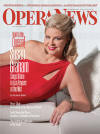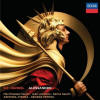Texte paru dans: / Appeared in:
*

Opera News: (12/2012)
Pour
s'abonner / Subscription information
Decca
4784699

0028947846994 (ID250)
Consultez toutes les évaluations recensées pour ce cd
~~~~ Reach all the evaluations located for this CD
Alessandro (1726) has entered history as the opera in which Handel first had the services of rival prima donnas Faustina Bordoni (the newcomer) and Francesca Cuzzoni (the defending champ). The entrance of the two star female characters, playing two princesses being strung along as possible brides by Alexander the Great, is sublimely tactful, with equal amounts of recitative — some of it delivered by both divas simultaneously. The two characters have an almost equivalent number of arias (plus a duet) in which to exhibit their expressive and technical wares. In this superb September 2011 recording featuring conductor George Petrou and his responsive, style-attuned Armonia Atenea, all three choice starring roles are cast from strength.
As Lisaura, written for Cuzzoni, Karina Gauvin proves utterly delightful — expressive in rage and contentment alike, the complete mistress of her technically and emotionally challenging part. High mezzo Julia Lezhneva has been the victim/beneficiary of the music industry's current obsession with extreme youth. Caught here short of her twenty-second birthday, her fresh, light timbre and proficient technique seem far better suited to Rosanne (the Faustina role) than to Fiordiligi and some of the Rossini scores to which her voice has been subjected. Her recits are inflected with intelligence; the arias show fine musicianship and pleasing agility and tone but a somewhat limited coloristic palette, somewhat akin to a treble in impact. The titular star of the initial Alessandro production was the famed alto castrato Senesino, also one of Handel's defining mastersingers. It's a marathon role, with eight(!) arias, encompassing myriad challenges, and a trickily ambivalent characterization. Max Emanuel Cencic commands the music totally, offering some of the most attractive tone of his distinguished recording career.
Two other countertenors take part. To Xavier Sabata falls the sympathetic secondo uomo role of Tassile, the Indian King who is allied with Alexander, but who also pines for Lisaura. Alessandro has, like Agrippina, a pair of semi-comic secondary parts with an aria apiece — here, two ambitious Macedonian officers in Alexander's circle. Vasily Khoroshev (Cleonte) is more of a hell-for-leather kind of countertenor, but he stays within the stylistic framework. Spanish tenor Juan Sancho (as his co-conspirator Leonato) sings with assured style but a rather narrow timbre. Korean bass In-Sung Sim dispatches Clito — the generally loyal officer who alone refuses to worship his commander as a god — with handsome tone if somewhat aspirated coloratura.
Alessandro, very demanding to cast, is consequently rarely staged. The Badisches Staatstheater (Karslruhe) features a production in February with Lawrence Zazzo as Alessandro; this coming May, Petrou will lead a Lucinda Childs-directed staging at Versailles with the orchestral forces on these Decca CDs plus Cencic, Sabata, Khoroshev and Sancho. This marks the opera's fourth appearance on records, and the present Decca issue jumps to the top of the class, confirming Petrou's status as one of the world's rising Handelian star conductors.
Cliquez l'un ou l'autre
bouton pour découvrir bien d'autres critiques de CD
Click either button for many other reviews


